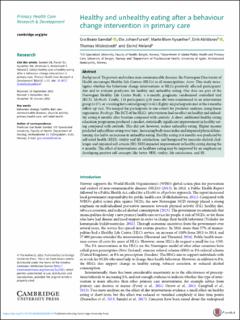Healthy and unhealthy eating after a behaviour change intervention in primary care
Samdal, Gro Beate; Furset, Ole Johan; Nysæther, Marte Blom; Abildsnes, Eirik; Mildestvedt, Thomas; Meland, Eivind
Journal article, Peer reviewed
Published version

Åpne
Permanent lenke
https://hdl.handle.net/11250/2997709Utgivelsesdato
2022Metadata
Vis full innførselSamlinger
Originalversjon
Primary Health Care Research and Development. 2022, 23, e23. 10.1017/S1463423622000147Sammendrag
Background:
To prevent and reduce non-communicable diseases, the Norwegian Directorate of Health encourages Healthy Life Centres (HLCs) in all municipalities.
Aims:
This study investigates whether the behaviour change interventions at HLCs positively affected participants’ diet and to evaluate predictors for healthy and unhealthy eating. Our data are part of the Norwegian Healthy Life Centre Study, a 6-month, pragmatic randomised controlled trial (RCT).
Methods:
Totally, 118 participants ≥18 years old were randomised to an intervention group (n 57), or a waiting list (control group) (n 61). Eighty-six participants met at the 6 months follow-up visit. We merged the participants to one cohort for predictor analyses, using linear regressions.
Findings:
The RCT of the HLCs’ interventions had no effect on healthy and unhealthy eating 6 months after baseline compared with controls. A short, additional healthy eating education programme produced a modest, statistically significant improvement in healthy eating compared with controls. This did not, however, reduce unhealthy eating. Higher income predicted unhealthier eating over time. Increasing body mass index and impaired physical functioning also led to an increase in unhealthy eating. Healthy eating at 6 months was predicted by self-rated health (SRH), vitality and life satisfaction, and hampered by musculo-skeletal challenges and impaired self-esteem (SE). SRH impacted improvement in healthy eating during the 6 months. The effect of interventions on healthier eating may be improved by an emphasis on developing positive self-concepts like better SRH, vitality, life satisfaction, and SE.
